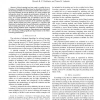Free Online Productivity Tools
i2Speak
i2Symbol
i2OCR
iTex2Img
iWeb2Print
iWeb2Shot
i2Type
iPdf2Split
iPdf2Merge
i2Bopomofo
i2Arabic
i2Style
i2Image
i2PDF
iLatex2Rtf
Sci2ools
125
click to vote
IJCNN
2008
IEEE
2008
IEEE
Active Meta-Learning with Uncertainty Sampling and Outlier Detection
Abstract— Meta-Learning has been used to predict the performance of learning algorithms based on descriptive features of the learning problems. Each training example in this context, i.e. each meta-example, stores the features of a given problem and information about the empirical performance obtained by the candidate algorithms on that problem. The process of constructing a set of meta-examples may be expensive, since for each problem avaliable for meta-example generation, it is necessary to perform an empirical evaluation of the candidate algorithms. Active Meta-Learning has been proposed to overcome this limitation by selecting only the most informative problems in the meta-example generation. In this work, we proposed an Active Meta-Learning method which combines Uncertainty Sampling and Outlier Detection techniques. Experiments were performed in a case study, yielding significant improvement in the MetaLearning performance.
Active Meta-Learning | Artificial Intelligence | Candidate Algorithms | IJCNN 2008 | Meta-example Generation |
Related Content
| Added | 31 May 2010 |
| Updated | 31 May 2010 |
| Type | Conference |
| Year | 2008 |
| Where | IJCNN |
| Authors | Ricardo Bastos Cavalcante Prudêncio, Teresa Bernarda Ludermir |
Comments (0)

